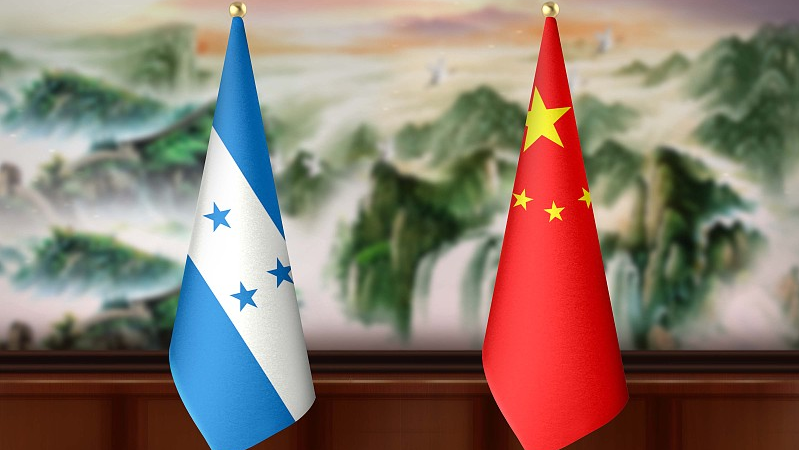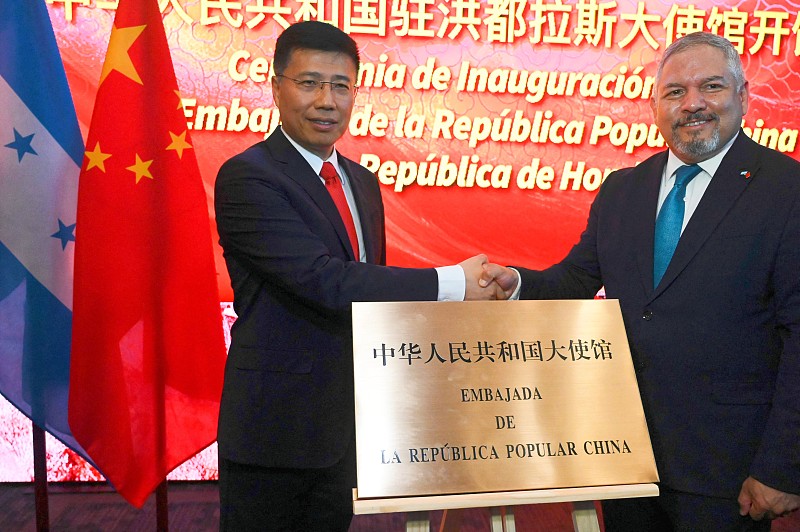
National flags of China and Honduras. /CFP
National flags of China and Honduras. /CFP
Editor's note: Imran Khalid, a special commentator on current affairs for CGTN, is a freelance columnist on international affairs. The article reflects the author's opinions and not necessarily the views of CGTN.
"The refounding of Honduras demands new political, scientific, technical, commercial and cultural horizons." This is how Honduran President Xiomara Castro tweeted on June 6 about the main objectives of her state visit to China. Castro's historic visit to China symbolizes the fruitful relationship between the two countries, following the establishment of official diplomatic ties in March. This significant milestone demonstrates the mutual respect and trust shared between the two nations.
The visit reflects Castro's visionary approach to international diplomacy, fostering stronger economic and cultural cooperation. It paves the way for enhanced bilateral trade, technological exchange, and people-to-people connections, promoting prosperity and mutual benefits for both China and Honduras.
The seeds of President Castro's visit to China were sown long ago, during her presidential campaign last year. It is important to note that recognizing the one-China principle, which China adheres to, is not a new concept but rather a widely accepted norm in international relations. Honduras' decision to align with this principle is a self-determined choice that serves its national interests.
By aligning itself with China, Honduras stands as an example for other nations contemplating severing "diplomatic ties" with China's Taiwan region. This move, experts argue, positions these countries on the right side of history, fostering stronger bonds with China and promoting global harmony in the process.
As the world's second-largest economy, China has demonstrated its commitment to fostering economic cooperation and development in developing nations, offering public goods that have garnered support and recognition from a majority of these nations.
From an economic and trade perspective, forging diplomatic ties with China holds immense potential for Honduras. It opens doors to new avenues of development, providing valuable opportunities to enhance the nation's economy and uplift the lives of its people. By embracing this collaboration, Honduras sets itself on a path toward progress and prosperity, fueled by the benefits of engaging with a global powerhouse like China.
In an extraordinary display of diplomatic alacrity, China and Honduras have moved swiftly in forging a robust partnership since establishing formal diplomatic ties a mere three months ago. Their collaboration has spanned a multitude of domains, ranging from economy and trade to agriculture, technology, culture, education, and media. Notably, both nations have already reaped significant rewards from their budding partnership, showcasing the immense potential for fruitful cooperation.
Further solidifying this bond, China proudly unveiled its embassy in Honduras on June 5, a symbolic gesture underscoring the strength and sincerity of their bilateral relations. As a testament to their shared commitment, President Castro has embarked on a landmark visit to China, cementing the foundations of an enduring friendship and opening doors to new avenues of collaboration. President Castro's visit to China, in light of their recent establishment of diplomatic relations, was a natural progression that had been witnessed ever since the Honduras president took charge last year.

Yu Bo (L), charge d'affaires of the Chinese embassy in Honduras, and Honduran Foreign Minister Eduardo Reina inaugurate the opening of the Chinese embassy in Tegucigalpa, Honduras, June 5, 2023. /CFP
Yu Bo (L), charge d'affaires of the Chinese embassy in Honduras, and Honduran Foreign Minister Eduardo Reina inaugurate the opening of the Chinese embassy in Tegucigalpa, Honduras, June 5, 2023. /CFP
During Castro's visit, discussions are anticipated to center around the intricate tapestry of cooperation between the two nations. Key areas of focus include the augmentation of Honduras' agricultural exports to the Chinese market, fostering mutually beneficial trade relations. Moreover, deliberations are expected to extend to China's investment in Honduras, facilitating economic growth and prosperity. Additionally, the talks will encompass collaborative endeavors under the ambitious Belt and Road Initiative, forging paths towards shared development and connectivity on a global scale.
In recent years, Chinese trade with Honduras has experienced substantial growth, signaling the deepening economic ties between the two nations. Currently, Honduras is seeking support for its upcoming hydroelectric dam initiative. Notably, the construction of the Patuca III dam project was successfully finished by the Power Construction Corporation of China. Building upon this fruitful collaboration, Honduras now looks to secure China's assistance for the Patuca II project, further cementing their partnership in advancing sustainable energy solutions.
In recent years, a narrative of forging new cooperation as an alternative to Western influence has gained momentum across the globe. Initiatives such as the Global Development Initiative and the Global Security Initiative exemplify China's expanding global role. As a result, while infrastructure and economic ties remain relevant, Honduras can also anticipate a more security-oriented approach from China in its engagements with the Global South.
(If you want to contribute and have specific expertise, please contact us at opinions@cgtn.com. Follow @thouse_opinions on Twitter to discover the latest commentaries in the CGTN Opinion Section.)